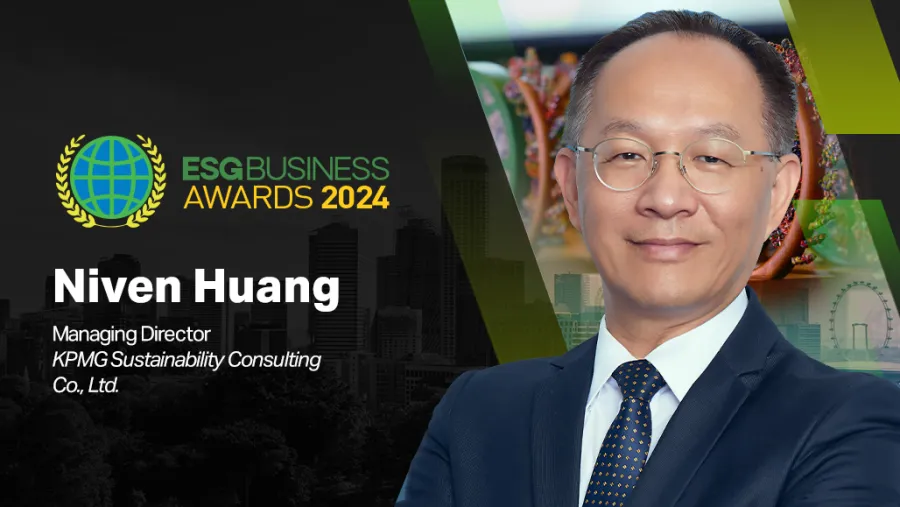
KPMG Director: Companies ‘still far’ from integrating ESG into product and process design, innovation
Huang mentions that compensation schemes for integrating ESG indicators should be in place.
Formerly the Head of ESG for KPMG Asia Pacific, Dr. Niven Huang is now the Managing Director of KPMG Sustainability Consulting Co., Ltd. He has worked on ESG and corporate sustainability for more than 25 years. Huang is a pioneer in Taiwan for promoting corporate social responsibility, sustainability reporting, socially responsible investments, corporate sustainability strategy, and carbon management.
He is also a part-time associate professor of several universities in Taiwan, where he teaches advanced MBA and EMBA programmes.
Prior to joining the company, Huang was also the Secretary General of the Business Council for Sustainable Development in Taiwan for 16 years.
As a distinguished judge for this year’s iteration of the ESGBusiness Awards, the KPMG director shares his thoughts on ESG trends in Asia Pacific for the past few years, the critical elements needed by businesses to integrate the concept into their operations, measuring impact of ESG initiatives on their overall business performance, and the innovative approaches to advance ESG objectives.
As the former Head of ESG for KPMG Asia Pacific, what are the most significant ESG trends you’ve observed in recent years, particularly in the Asia Pacific region?
More ESG regulations with a fast development in the region, covering sustainability reporting, climate disclosure, carbon pricing and sustainable finance. However, compliance-driven actions have not delivered impactful results. Business cases are needed to prove ESG pays so that more impactful and revolutionary sustainability innovations can be inspired.
In your opinion, what are the critical elements that businesses should focus on to genuinely integrate sustainability into their core operations?
A top-down process and effective ESG governance or management system in place are the must. Sector-specific double materiality analysis is [also] a starting point for ESG integration business strategy.
C-suite level executives take the championship because of integration of ESG performance indicators into compensation schemes; the outcome and impact should be delivered by core products and services.
What are some common challenges companies face when trying to implement effective ESG strategies, and how can they overcome these obstacles?
Some common challenges companies face when trying to implement effective ESG strategies include top-down support with resources and investment allocation. The global supply chains have [also] not yet taken it seriously on ESG, and ESG performance of suppliers have not been integrated into business decisions. [They are] still far from integrating ESG into products and processes design and technology innovation.
They can overcome these obstacles by building up an effective ESG governance and management system, capacity building and training to all levels of employees, money talks, compensation schemes of integrating ESG indicators should be in place, and imposing a vital role of the capital market for financing and investing.
How can companies measure the impact of their ESG initiatives on their overall business performance and societal contributions?
Companies can measure the impacts of their ESG initiatives by identifying impact indicators first based on double materiality (financial and ESG); ESG data collection and analytics, including disaggregation and aggregation analysis, so that accountability of executives is clear enough, and; transparency and continuous engagement with stakeholders to ensure a meaningful performance tracking system.
Looking ahead, what innovative approaches or technologies do you believe will have the most significant impact on advancing ESG objectives? How can companies leverage these innovations to not only meet but exceed current ESG standards and expectations?
Eco-efficiency analysis approach is a must for exploring new products with triple-bottom line; cleantech which can do more with less, including hydrogen and nuclear fusion, and; development of reverse logistics for all kinds of post consumer products.
Nobody can do it alone on sustainability. [There is] no free lunch for ESG achievement. Business needs to invest for long term value creation and continuous stakeholders engagement for exploring collaboration to deliver synergy.
As a judge in the ESGBusiness Awards 2024, what criteria do you consider most critical when evaluating companies for these awards?
Evidence of effective governance and management system for ESG; ESG-performance integration for executives compensation scheme, and percentage of ESG-driven products and services in annual revenue.














